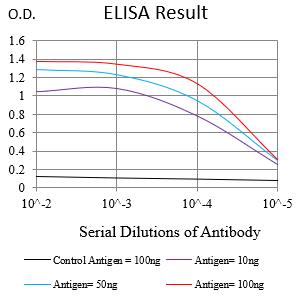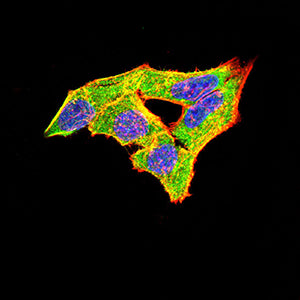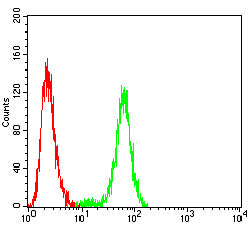


| WB | 咨询技术 | Human,Mouse,Rat |
| IF | 咨询技术 | Human,Mouse,Rat |
| IHC | 咨询技术 | Human,Mouse,Rat |
| ICC | 1/50 - 1/200 | Human,Mouse,Rat |
| FCM | 1/200 - 1/400 | Human,Mouse,Rat |
| Elisa | 1/10000 | Human,Mouse,Rat |
| Aliases | FASLG; APTL; FASL; CD95L; ALPS1B; CD95-L; TNFSF6; TNLG1A; APT1LG1 |
| Entrez GeneID | 356 |
| clone | 2A6E12 |
| WB Predicted band size | 31.5kDa |
| Host/Isotype | Mouse IgG1 |
| Antibody Type | Primary antibody |
| Storage | Store at 4°C short term. Aliquot and store at -20°C long term. Avoid freeze/thaw cycles. |
| Species Reactivity | Human |
| Immunogen | Purified recombinant fragment of human CD178 (AA: extra 103-281) expressed in E. Coli. |
| Formulation | Purified antibody in PBS with 0.05% sodium azide |
+ +
以下是关于CD178(FasL)抗体的3篇代表性文献,供参考:
---
1. **文献名称**:*Melanoma cell expression of Fas(Apo-1/CD95) ligand: implications for tumor immune escape*
**作者**:Hahne M, Rimoldi D, Schröter M, et al.
**摘要**:该研究首次报道黑色素瘤细胞通过表达FasL(CD178)诱导肿瘤浸润淋巴细胞的凋亡,从而逃避免疫清除。实验中利用抗FasL抗体阻断该通路,证实了FasL在肿瘤免疫逃逸中的关键作用。
---
2. **文献名称**:*Fas ligand-induced apoptosis as a mechanism of immune privilege*
**作者**:Griffith TS, Brunner T, Fletcher SM, et al.
**摘要**:研究探讨了FasL(CD178)在免疫豁免组织(如眼睛和睾丸)中的作用,发现其通过介导激活T细胞的凋亡维持免疫耐受。实验中使用抗CD178抗体验证了FasL-Fas信号轴在此过程中的必要性。
---
3. **文献名称**:*Activation-induced cell death in T cells via the Fas-Fas ligand pathway*
**作者**:Dhein J, Walczak H, Bäumler C, et al.
**摘要**:文章阐明了T细胞活化后通过FasL(CD178)与其受体Fas结合触发自身或邻近T细胞凋亡的机制(即活化诱导细胞死亡,AICD)。研究利用特异性CD178抗体阻断实验,证实该通路对维持外周免疫稳态至关重要。
---
**备注**:上述文献多发表于1990年代,属于FasL功能研究的经典工作。若需近年研究,可补充关键词如“CD178 antibody therapeutic”或“soluble FasL detection”进行文献更新。
CD178. also known as Fas ligand (FasL), is a member of the tumor necrosis factor (TNF) superfamily and plays a critical role in apoptosis and immune regulation. As a type II transmembrane protein, CD178 binds to its receptor Fas (CD95), triggering caspase-dependent programmed cell death. This interaction is essential for maintaining immune homeostasis, particularly in eliminating infected, cancerous, or autoreactive cells. CD178 is predominantly expressed by activated T cells, natural killer (NK) cells, and immune-privileged tissues (e.g., eyes, testes), where it helps enforce tolerance and prevent inflammation.
CD178 antibodies are research tools designed to detect, quantify, or modulate FasL activity. They are widely used in studying apoptosis pathways, immune cell interactions, and diseases linked to dysregulated Fas/FasL signaling, such as autoimmune disorders (e.g., lupus, rheumatoid arthritis), cancer immune evasion, and transplant rejection. Monoclonal anti-CD178 antibodies can block FasL-Fas binding to inhibit apoptosis in vitro, aiding mechanistic studies, while agonist antibodies may induce cell death in therapeutic contexts. However, therapeutic applications remain experimental due to risks like hepatotoxicity or unintended immune activation. In diagnostics, CD178 antibodies help profile FasL expression in tissues or circulating soluble forms, offering insights into disease progression. Validation of these antibodies requires careful specificity testing, as cross-reactivity with other TNF family members can confound results. Overall, CD178 antibodies remain pivotal in unraveling the complex roles of FasL in health and disease. (298 words)
×